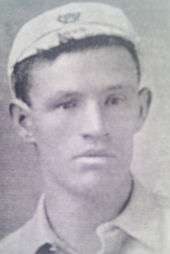Rab Howell
Rabbi "Rab" Howell (12 October 1869 – 1937) was a nineteenth-century professional footballer who played for Sheffield United and Liverpool primarily as a defender. Born in Wincobank in Sheffield he was of Romani descent and was the first Romani to play for England, winning two caps.[2]
 Rab Howell | ||||||||||||||||
| Personal information | ||||||||||||||||
|---|---|---|---|---|---|---|---|---|---|---|---|---|---|---|---|---|
| Full name | Rabbi Howell | |||||||||||||||
| Date of birth | 12 October 1869 | |||||||||||||||
| Place of birth | Wincobank, Sheffield, England[1] | |||||||||||||||
| Date of death | 22 November 1937 (aged 68) | |||||||||||||||
| Place of death | Preston, Lancashire, England[1] | |||||||||||||||
| Height | 5 ft 5 in (1.65 m) | |||||||||||||||
| Playing position(s) | Centre half | |||||||||||||||
| Youth career | ||||||||||||||||
| 1887–1889 | Ecclesfield | |||||||||||||||
| Senior career* | ||||||||||||||||
| Years | Team | Apps | (Gls) | |||||||||||||
| 1889–1890 | Rotherham Swifts | |||||||||||||||
| 1890–1898 | Sheffield United | 192 | (8) | |||||||||||||
| 1898–1901 | Liverpool | 59 | (0) | |||||||||||||
| 1901–1903 | Preston North End | |||||||||||||||
| National team | ||||||||||||||||
| 1895–1899 | England | 2 | (1) | |||||||||||||
Honours
| ||||||||||||||||
| * Senior club appearances and goals counted for the domestic league only | ||||||||||||||||
Club career
Sheffield United
Howell was a highly skilled player despite his small size (5 feet 5 inches or 1.65 metres), playing as a nippy half-back or inside right. He began his career with the Sheffield club Ecclesfield and also played for Rotherham Swifts before signing along with two other Swifts players, Arthur Watson and Michael Whitham for newly formed Sheffield United in March 1890.[1] Although he made his debut as a striker Howell was soon moved to defence where he played for the remainder of his career. He won promotion with the Blades to the First Division in 1893, and, in 1897–98, a Championship medal.
"Rab Howell," observed the player's Sheffield United teammate Ernest Needham,
- "a gypsy by birth, perhaps owes some of his inexhaustible vitality to his lucky parentage. Certain it is that no man is more untiring. In his right-hand position this light-weight player (9st.12lbs or 57.3 kg.) always excels. He rejoices at meeting the best of forward wings, and should the outside man indulge in dribbling he sticks to him like a leech. Many duels have I seen between him and Fred (Spiksley of The Wednesday), and generally Howell has come off best. Unfortunately he is a little too fond of keeping the ball too long, and loses many opportunities."[3]
Howell often fell foul of the club hierarchy who imposed strict codes of conduct on their players, and regularly appeared in front of the Football Committee on charges of 'misconduct' although this often resulted in him being offered a pay increase and asked to 'mend his ways'.[1] More serious allegations were to be levelled at him however, as in his final season at the club he was believed to have attempted to throw a game against rivals for the Championship Sunderland, scoring two own goals.[4] No charges were ever brought but Howell only played one more game for United before being quietly sold to Liverpool.[1] He left Bramall Lane having played for 5 years, making over 200 appearances for the club. There is no evidence of match fixing, however. A more likely explanation for his sudden departure is his extra-marital affair: he set up another family in Lancashire after he left for Liverpool. Such a scandal in Victorian times would have been hushed up.
Liverpool and Preston North End
In April 1898 Howell was transferred to Liverpool for a fee of £200, making his debut for the club in a game against Aston Villa. He played 68 times for Liverpool, scoring no goals. Three years later he moved on to Preston North End, where his career was ended by broken leg in 1903.
International career
Howell scored once for the national team, on his debut in a 9–0 rout of Ireland in April 1895. His second and last appearance came in a win against Scotland four years later.
International goals
| # | Date | Venue | Opponent | Result | Competition | Scored |
|---|---|---|---|---|---|---|
| 1 | 9 March 1895 | County Cricket Club, Derby | 9–0 | Home Championship | 1 |
Honours
Sheffield United
- Football League Division One champions: 1897–98
- Football League Division One runners-up: 1896–97
- Football League Division Two runners-up: 1892–93
Personal life
It seems likely that Howell was born, and lived as a child, in a Romani encampment in Sheffield. His father's profession is listed on his birth certificate as a "besom-maker." By the time of the 1871 census, however, the family were living in a house in Stocks Hill in Ecclesfield. Some of the misinformation about Rab comes from people believing an interview he gave to a match day programme in 1897 where he says amongst other things, spinning people along, that he lived in a caravan: which he clearly didn't as census returns show.
References
- Denis Clarebrough & Andrew Kirkham (2008). Sheffield United Who's Who. Hallamshire Press. pp. 168–169. ISBN 978-1-874718-69-7.
- "Gypsy and traveller footballers". Retrieved 6 May 2012.
- Ernest Needham (2003) [1901]. Association Football (reprint). Cleethorpes: Soccer Books. ISBN 1-86223-083-8.
- Sheffield and Rotherham Independent 7 March 1898
External links
- Rab Howell at Englandstats.com
- 'Rab' Howell's Liverpool FC player profile
- Profile at LFCHistory.net